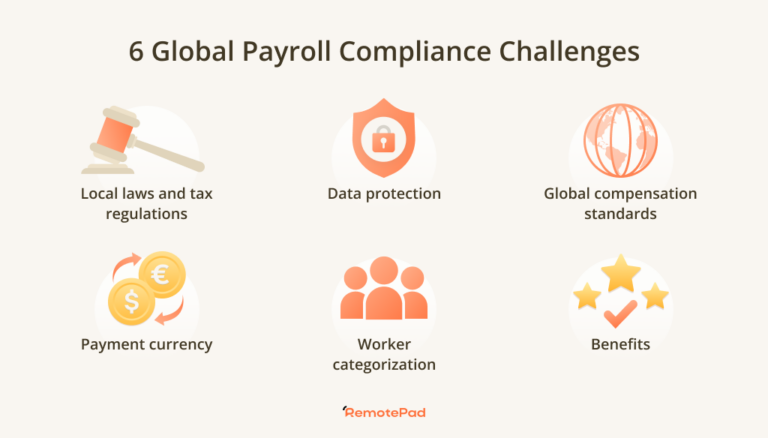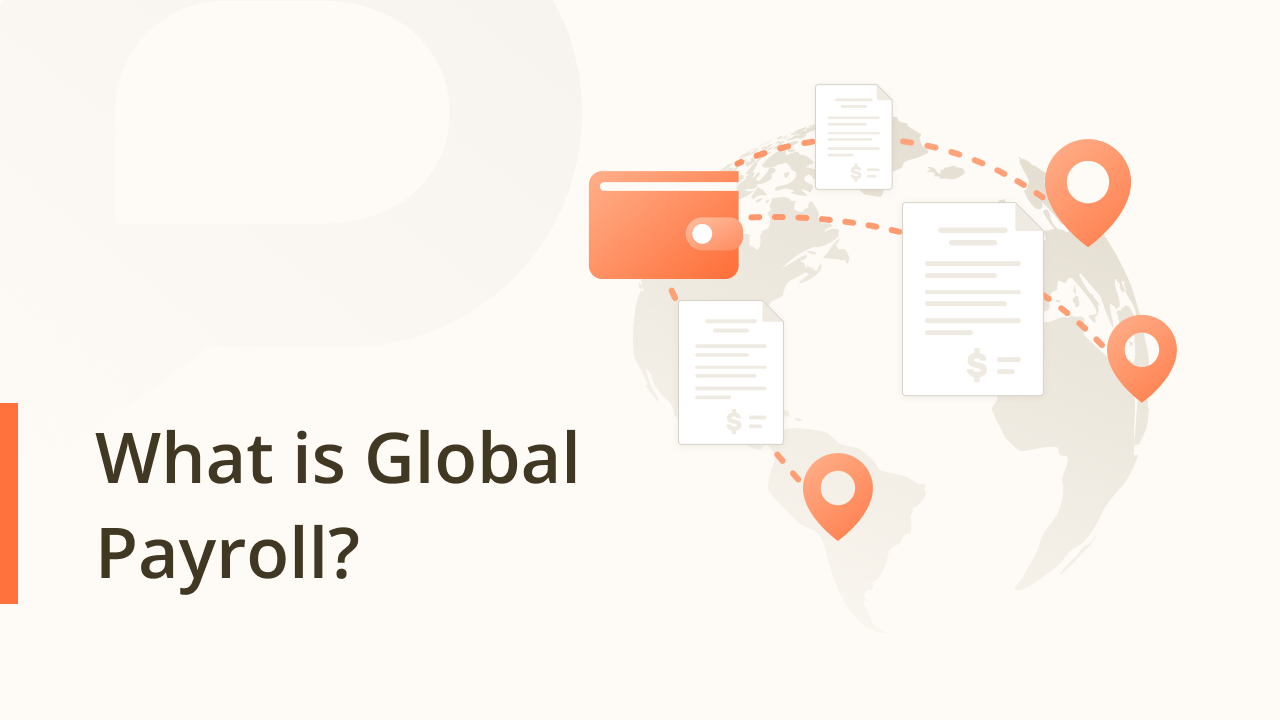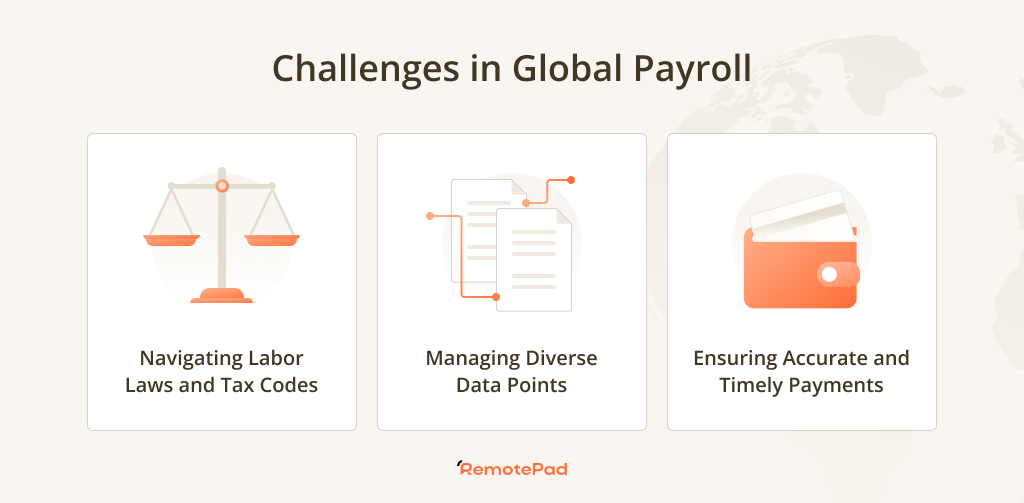Spending too much on recruitment, payroll or global HR?
We help you find the Best Providers at the lowest cost.
Key Takeaways
Global payroll involves understanding and adhering to local employment laws, tax regulations, payment methods and data privacy across different countries.
Outsourcing global payroll to international payroll service providers offers compliance, expertise, and cost-saving benefits, such as access to experienced specialists and streamlined processes.
When selecting a global payroll solution, it is important to evaluate provider models and the services offered. Automating workflows can improve accuracy and efficiency.
Navigating the world of international payroll processing can be daunting for any business with a global presence. As companies expand their reach across borders, the complexities of managing payroll for a diverse workforce multiply. How can companies ensure compliance with ever-changing local labor laws, control currency conversions, and protect sensitive payroll data? In this blog post, we’ll explore the ins and outs of global payroll, delving into its challenges, benefits, and best practices for managing international payroll processes efficiently and effectively.
Understanding Global Payroll
Global payroll is the process of managing payroll for international employees. It involves:
- Ensuring compliance with local labor laws, tax regulations, and currency conversions
- Tax withholding and settling
- Wage calculation
- Pay slip distribution
- Adherence to labor laws
The importance of global payroll compliance is underscored by its role in maintaining adherence to local labor laws, tax regulations, and data privacy protection. One way to simplify global payroll management is by utilizing an employer of record (EOR), which enables the employment of international workers without establishing a legal entity in each country. Note that global payroll software may serve some of these functions but certainly not all.
The Basics of Global Payroll
The fundamentals of global payroll encompass comprehending local employment regulations, tax regulations, and payment methods across diverse nations, especially when dealing with international workers. Countries worldwide may have diverse legislation concerning labor issues such as forced or child labor, workplace discrimination, and leave policies for sickness or parenting. These laws exist to protect the rights of workers across different nations.
Maintaining compliance requires:
- Providing the proper employment contract
- Ensuring legal registration
- Making timely tax and obligation payments
- Offering statutory and optional benefits
- Keeping up with regulatory changes.
Moreover, data protection is a crucial concern, as businesses must adhere to data protection regulations like the General Data Protection Regulation (GDPR).
Global vs. Local Payroll
Global payroll complexity surpasses local payroll due to the varying labor laws, currencies, taxes, and regulations across countries.
One of the most challenging aspects of international recruitment is determining salaries at an appropriate level. Establishing a legal entity is financially advantageous once a strategic decision has been taken to create a foreign subsidiary or an overseas branch and the company intends to employ a workforce of 15-20 people overseas.
Companies that outsource global payroll can reap benefits such as compliance and risk mitigation, access to local expertise, and time and cost savings.
Critical Components of Global Payroll Management
A global payroll solution aims to amalgamate and normalize payroll streams on a single platform, simplify reporting, ensure compliance, and aid in accurate and timely payments to international staff. The essential elements of global payroll management include adhering to employment regulations, currency exchange, and data protection. With global payroll processing, companies can streamline their payroll management and ensure a smooth employee experience.
A multi-country payroll platform facilitates the consolidation of data streams, automation of workflows, and standardization of information to simplify global payroll management.
Compliance with Employment Laws and Tax Regulations
Adhering to local employment laws and tax regulations is essential for successful global payroll management. An employer of record (EOR) serves as the legal employer and global payroll manager of personnel, providing:
- A streamlined global payroll process
- Immediate reporting
- A single payroll data source
- Experienced payroll specialists to collaborate with.
Companies must comply with country-specific requirements accurately, including:
- Regulations for classifying employees
- Minimum wage laws
- Mandatory employee benefits
- Tax laws and deadlines
- Adherence to local tax regulations and employment laws
Currency Conversion and International Payments
For global payroll, payment accuracy, and timeliness are crucial to ensure employees receive their remuneration on time and avoid payment delays and errors. Utilizing a global payroll solution provides real-time payroll data and information, essential for accurately representing a business’s value and allocating resources toward recruiting international talent.
Currency conversion and international payments are critical components of any good global payroll services provider, necessitating precise computations and prompt transfers.
Data Security and Privacy
In a global payroll, data security and privacy are of supreme importance, as organizations must comply with data protection legislations like GDPR and local privacy norms. Partnering with a global payroll provider and local experts can provide valuable support in every country where you hire, ensuring data security and compliance.
Companies can ensure data security and privacy by implementing data protection policies, encrypting data, and utilizing secure authentication methods.

Challenges in Global Payroll
Some challenges associated with global payroll include adherence to diverse labor regulations, aggregation of multiple data points, and ensuring timely and accurate payments. In fact, the challenges of global payroll can be quite complex for businesses operating in multiple countries.
Reporting and visibility in global payroll can be complicated, as the complexity of payroll data for a global workforce is typically spread across multiple systems, spreadsheets, and locations, making it difficult to retrieve and standardize the data for analysis. Furthermore, utilizing error-prone payroll processes for global companies can lead to incorrect payments and compliance issues.
Navigating Labor Laws and Tax Codes
Navigating labor laws and tax codes across various countries can be challenging, requiring relentless monitoring for changes and updates. Employers are typically obligated to withhold taxes for employees, whereas contractors are generally responsible for their own taxes.
Organizations must adhere to the following tax requirements to remain compliant:
- Federal and local income taxes
- Payroll tax
- Tax deadlines
- Tax withholding regulations
Engaging the services of an EOR or PEO does not necessarily alter your permanent establishment risk, however, a reliable partner can assist you in comprehending and managing your risk exposure.
Managing Diverse Data Points
The management of diverse data points from across multiple locations and departments is a substantial challenge in global payroll, necessitating the effective consolidation and standardization of data. The data points necessary for global payroll include:
- The number of data points collected and processed
- Payments and taxes
- Employee work hours
- Overtime allocation and payments
- Sickness and absence records
- Location and population data
- Gross pay calculations
Automated payroll systems can be utilized to:
- Collect, process, and store data from multiple locations and departments
- Allow for efficient data consolidation and standardization
- Ensure accuracy and compliance with global payroll regulations.
Ensuring Accurate and Timely Payments
For effective global payroll administration, it’s critical to ensure precise and timely payments to employees, tax authorities, and benefits vendors. Payments must be made to employees, tax authorities, and benefits vendors as part of benefits administration.
The primary obstacles to ensuring precise and prompt payments in global payroll involve navigating labor laws and tax codes, managing disparate data points, and guaranteeing adherence with employment laws and tax regulations.
More on Global Payroll Data
Understanding global payroll complexities is essential for any organization venturing into the international marketplace. This table compiles crucial data categories that provide a foundation for navigating the intricacies of paying employees across borders. By familiarizing yourself with these elements, you can ensure compliance with local regulations, manage costs effectively, and maintain a smooth payroll process for your international workforce.
| Data Category | Explanation |
| Country-Specific Regulations | Labor laws, tax codes, social security contribution rates, and mandatory benefits differ wildly from country to country. Staying compliant and avoiding costly penalties requires understanding each location’s regulations. |
| Currency Exchange Rates | Fluctuating exchange rates directly impact the cost of paying employees in different countries. Tracking and projecting currency shifts are crucial for budget management. |
| Local Holidays and Payroll Cycles | Each country has its own unique set of holidays and customary pay periods (weekly, biweekly, monthly, etc.). These must be factored into payroll schedules to prevent delays. |
| Payroll Tax Withholding Amounts | Individual income tax rates, social security contributions, and other payroll taxes vary significantly between countries. Employers must have accurate calculations for timely deductions and filings with authorities. |
| Benefits and Allowances | Statutory and culturally expected benefits like paid time off, health insurance, transportation allowances, etc., differ across the globe. These need to be considered in total compensation packages and payroll calculations. |
| Data Privacy Laws | Employee payroll information is highly sensitive. Each country has data handling laws (like the EU’s GDPR), outlining how this information can be stored, processed, and protected. |
| Reporting Requirements | Countries have diverse needs in terms of how payroll data is submitted to governmental agencies. Understanding these reporting formats and deadlines is essential for compliance. |
Benefits of Outsourcing Global Payroll
Outsourcing global payroll brings a plethora of benefits including ensuring compliance, access to local expertise, and time and cost efficiencies.
A global payroll solution can help companies streamline global payroll operations, reduce costs, and minimize the risk of non-compliance penalties.
Compliance and Risk Mitigation
Outsourcing global payroll offers several benefits, including:
Ensuring compliance with local labor laws and tax regulations, reducing the risk of penalties and fines
Having an employer of record (EOR) serve as the legal employer, providing a streamlined global payroll process
Access to immediate reporting and a single payroll data source
Collaboration with experienced payroll specialists
Penalties and fines can be financially burdensome and can detrimentally affect a business’s profitability. Outsourcing global payroll can provide assurance of compliance with local labor laws and tax regulations, thereby reducing the risk of penalties and fines.
Access to Local Expertise
Access to local expertise through global payroll providers offers valuable insights and support for managing international payroll processes.
A dedicated project manager can monitor legal developments and ensure compliance with local labor laws and tax regulations.
Time and Cost Savings
Outsourcing global payroll can save time and money by reducing errors, streamlining processes, and eliminating the need for in-house payroll teams.
Automating global payroll processes can decrease manual processes, decrease the rate of errors, and improve efficiency. HR and finance teams are freed from tedious administrative tasks thanks to this solution. This allows them to spend more time and resources on mission-critical projects.
Choosing the Right Global Payroll Solution
The selection of an appropriate global payroll solution entails the evaluation of provider models and scrutiny of their services. When managing international payroll operations or outsourcing to a global payroll solution, there are various types of payroll providers available.
The satisfaction of your employees should be considered a priority.
Evaluating Provider Models
Assessment of provider models, like wholly-owned or aggregator models, aids in determining the most suitable fit for a company’s global payroll requirements. The wholly-owned model entails setting up an office in those countries by the international payroll solution provider. This enables them to conduct the entire operation from within..
Choosing a company with local expertise when outsourcing global payroll ensures that all of your needs can be met using locally owned entities in every country where you operate, as well as providing support for international contractors.
Assessing Provider Services
It’s crucial to assess provider services to ensure that the chosen global payroll solution complies with local laws and regulations and meets the company’s needs. In order to evaluate provider services, companies should consider the provider’s compliance support, local expertise, automation capabilities, and data security and privacy measures.
Outsourcing global payroll can assist organizations in reducing compliance and risk, gaining access to local expertise, and optimizing time and resources.
Implementing a Global Payroll System
The implementation of a global payroll system involves the optimization of data management and automation of payroll processes. The adoption of a global payroll solution is associated with cost savings, enhanced compliance, and a diminished risk of penalties and fines.
Streamlining Data Management
Streamlining data management in global payroll requires consolidating and standardizing data from various sources, ensuring accurate and efficient reporting.
A single platform can be utilized to store and manage data from multiple sources, enabling integration of data from payroll systems, HR systems, and other third-party applications. This platform facilitates data consolidation and standardization.
Automating Payroll Processes
Automation of payroll processes via a global payroll solution can diminish manual tasks, minimize errors, and enhance overall efficiency in managing international payroll. An automated platform allows for the standardization of reports from different departments and countries into a single, usable format, thus consolidating all data streams into a single stream of data.
This makes payroll processing more efficient and accurate with the use of payroll software.
Summary
In this blog post, we have explored the complexities of global payroll management, discussing the importance of compliance with local labor laws and tax regulations, the challenges faced by businesses in managing diverse data points and ensuring accurate payments, and the benefits of outsourcing global payroll. By selecting the right global payroll solution and implementing streamlined data management and automated processes, businesses can minimize errors, reduce costs, and ensure compliance, paving the way for a successful international payroll operation. The world of global payroll may be complex, but with the right tools, guidance, and expertise, your business can navigate it successfully and reap the rewards of a truly global workforce.
FAQ
Global payroll is a process of consolidating and standardizing all payroll data streams from around the world, followed by calculation and delivery of payments in local currency in full compliance with legal requirements.
Yes, ADP does global payroll. It provides a cloud solution for multi-country businesses to accurately pay employees, wherever their location. It includes one compliant system of record with local knowledge across 140 countries, as well as more streamlined operations and cost efficiencies.
To successfully do international payroll, it is necessary to categorize employees, establish a local entity, research labor and tax laws, configure the payroll process, determine employee benefits, select payment methods, run payroll, and maintain records.
Global payroll is a process for managing payroll across international boundaries, encompassing wage calculation, tax withholding, expenses, tracking work hours and more to ensure compliance with labor laws.
Global payroll management involves complying with employment regulations, managing currency exchange rates, and protecting employee data.



